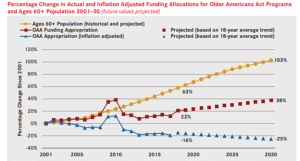Monday, February 13, 2023
Aging + Equity: Advocating for Healthy Longevity for All
Older adults are living longer, healthier lives than ever before in history. Most of us want to “age in place”. To support this home and community-based focus in our longer lives, we need to rethink our assumptions about aging and make changes to policy and legislation to ensure that everyone has access to the support they need to age well. As AgeGuide prepares to host its Advocacy Collaborative events this year, our priorities focus on building healthy, age-inclusive communities and support systems for all Illinois older adults and their caregivers.
Supporting Equity Means Supporting Aging Services
Illinois has a vibrant, diverse, and growing population of older adults. In fact, the aging population is expected to see a 50% increase in the next decade. That population is expected to become pretty evenly distributed to almost 50/50 white and non-white older adults by the year 2060. As the older population is becoming more racially and ethnically diverse, AgeGuide and the other state Area Agencies on Aging are committed to continuing to apply an equity lens to all aspects of service delivery. But, creating equitable communities and opportunities for older adults requires action and investment at the state and federal level.
Why We Need Renewed Investment
Unfortunately, even as the aging population grows, relative funding for aging services is not keeping pace, which exacerbates existing inequities for older adults from other under-represented groups, as shown in the chart below. This clearly shows the need for increased investment in Older Americans Act funding.
The red line in the chart shows aging funding allocations/projections from 2001-2030. The blue line tells the real story of what those dollars are worth when adjusted for inflation and the yellow line shows the growth of the over 60 population. As you can see, investment is sorely lacking, which brings us to our policy priorities.

Source: AARP Public policy Institute calculations from Regional Economic Models Inc.
AgeGuide Policy Priorities for FY 2023
- Support Essential Services
AgeGuide’s policy priorities address the growing disinvestment in aging services as demand for these programs continues to increase.
STATE ASK:
- Level funding ($44.3 million) for Home Delivered Meals
- Additional $1 million for Social Connection programs
- Additional $1 million for Alzheimer’s Disease and Related Disorders
The second two bullets are both recognized as statewide priorities in the Department on Aging’s state plan.
FEDERAL ASK:
- Increased investments particularly for Older Americans Act Title III B – Supportive Services
Appropriators must recognize that the foundational capacity of Older Americans Act programs must be dramatically increased to both meet the ongoing need that exists even as the pandemic begins to wane and to address a rapidly aging population.
- Support Family Caregivers
Research shows that most of us want to live at home and in our own communities as long as possible. To do so, we will need support. Investing in caregivers saves the state millions of dollars by delaying Medicaid payments for nursing homes stays and helps keep older adults and family members where they want to stay – at home.
STATE ASK:
Last session, the Illinois General Assembly granted our request to allocate, for the first time, $4M in state funding to support Illinois family caregivers. These new state dollars are supporting a new assessment tool to provide services and supports, specifically tailored to each caregiver’s needs, with the intent to help families keep loved ones at home as long as possible. AgeGuide and the other Illinois Area Agencies on Aging are asking for a $2 million increase to support caregivers. This will allow us to serve more caregivers and provide essential support and resources including:
- Tailored interventions
- Support services & respite care
- Hands-on-caregiver training & stress relief
- Support for grandparents raising grandkids (kinship care)
FEDERAL ASK:
- Increase federal investment in Older Americans Act Title III E – National Family Caregiver Support Program
How You Can Help
There are several ways you can help support these advocacy priorities:

